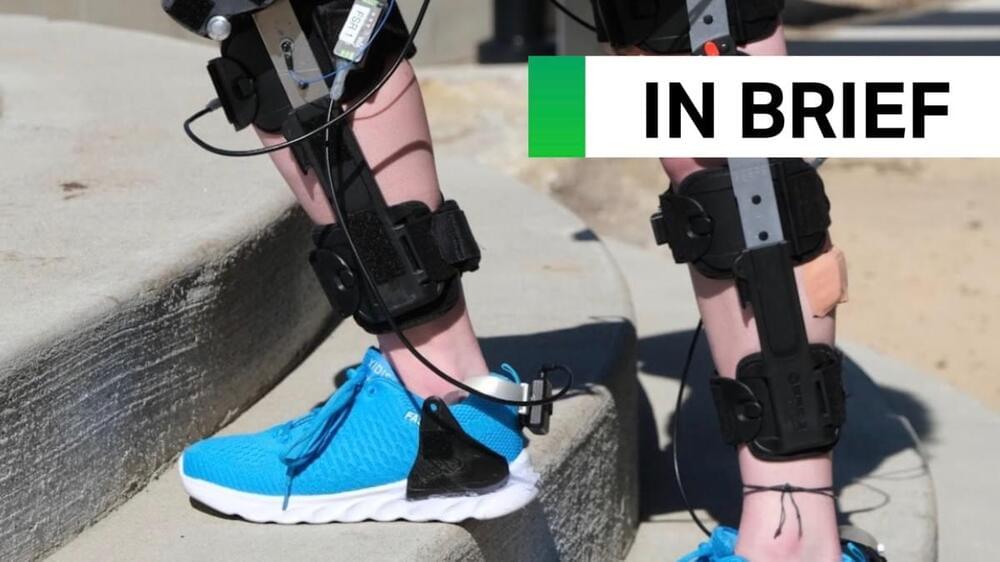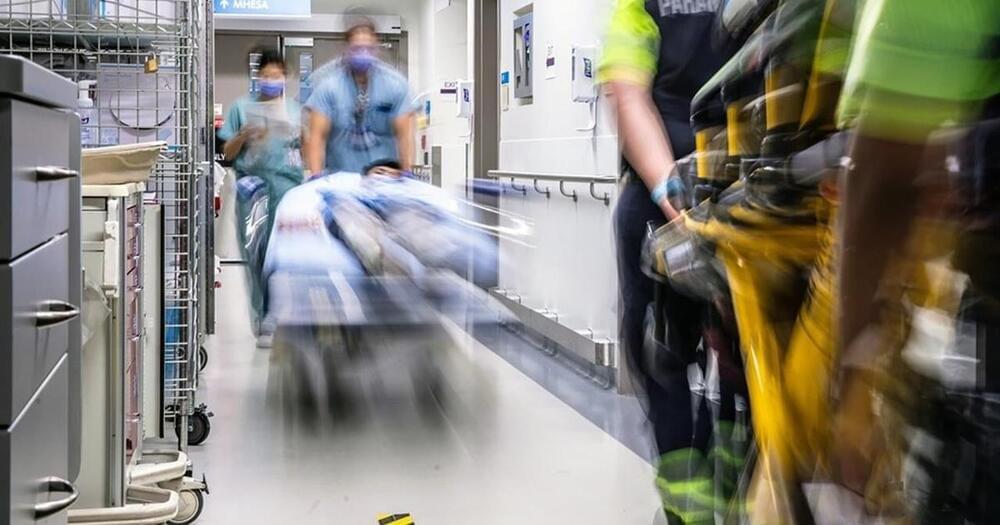Long overlooked by biographers, Albert Einstein’s time at Oxford—and his reasons for leaving—are worth revisiting, argues a new #ScienceBooks essay.



Robotic exoskeletons are an increasingly popular method for assisting human labor in the workplace. Those that specifically support the back, however, can result in bad lifting form by the wearer. To combat this, researchers at the University of Michigan have built a pair of robot knee exoskeletons, using commercially available drone motors and knee braces.
“Rather than directly bracing the back and giving up on proper lifting form,” U-M professor Robert Gregg notes, “we strengthen the legs to maintain it.”
Test subjects were required to move a 30-pound kettlebell up and down a flight of stairs. Researchers note that the tech helped them maintain good lifting form, while lifting more quickly.

The study, published Monday in the Canadian Medical Association Journal, found a 26 per cent reduction in non-palliative deaths among patients in St. Michael’s Hospital’s general internal medicine unit when the AI tool was used.
“We’ve seen that there is a lot of hype and excitement around artificial intelligence in medicine. We’ve also seen not as much actual deployment of these tools in real clinical environments,” said lead author Dr. Amol Verma, a general internal medicine specialist and scientist at the hospital in Toronto.

Results could aid understanding of how black holes produce vast intergalactic jets. Scientists have observed new details of how plasma interacts with magnetic fields, potentially providing insight into the formation of enormous plasma jets that stretch between the stars.
Whether between galaxies or within doughnut-shaped fusion devices known as tokamaks, the electrically charged fourth state of matter known as plasma regularly encounters powerful magnetic fields, changing shape and sloshing in space. Now, a new measurement technique using protons, subatomic particles that form the nuclei of atoms, has captured details of this sloshing for the first time, potentially providing insight into the formation of enormous plasma jets that stretch between the stars.
Scientists at the U.S. Department of Energy’s (DOE) Princeton Plasma Physics Laboratory (PPPL) created detailed pictures of a magnetic field bending outward because of the pressure created by expanding plasma. As the plasma pushed on the magnetic field, bubbling and frothing known as magneto-Rayleigh Taylor instabilities arose at the boundaries, creating structures resembling columns and mushrooms.

Model grounded in biology reveals the tissue structures linked to the disorder. A researcher’s mathematical modeling approach for brain imaging analysis reveals links between genes, brain structure and autism.
A multi-university research team co-led by University of Virginia engineering professor Gustavo K. Rohde has developed a system that can spot genetic markers of autism in brain images with 89 to 95% accuracy.
Their findings suggest doctors may one day see, classify and treat autism and related neurological conditions with this method, without having to rely on, or wait for, behavioral cues. And that means this truly personalized medicine could result in earlier interventions.
HARRISBURG, Pa. — The owner of the shuttered Three Mile Island nuclear power plant said Friday that it plans to restart the reactor under a 20-year agreement that calls for tech giant Microsoft to buy the power to supply its data centers with carbon-free energy.
The announcement by Constellation Energy comes five years after its then-parent company, Exelon, shut down the plant, saying it was losing money and that Pennsylvania lawmakers had refused to bail it out.
The plan to restart Three Mile Island’s Unit 1 comes amid something of a renaissance for nuclear power, as policymakers are increasingly looking to it to bail out a fraying electric power supply, help avoid the worst effects of climate change and meet rising power demand driven by data centers.
13y Younger Biological Age.
(Blood Test #6 in 2024; Test #54 Since 2015)
Enjoy the videos and music you love, upload original content, and share it all with friends, family, and the world on YouTube.
First thoughts and preliminary insights into OpenAI’s GPT o1 Strawberry in the medical domain, with some expected and unexpected findings. We have a \.

Our final estimate of the achievable inter data center bandwidth by 2030 is 4 to 20 Pbps, which would allow for training runs of 3e29 to 2e31 FLOP. In light of this, bandwidth is unlikely to be a major constraint for a distributed training run compared to achieving the necessary power supply in the first place.
Expanding bandwidth capacity for distributed training networks presents a relatively straightforward engineering challenge, achievable through the deployment of additional fiber pairs between data centers. In the context of AI training runs potentially costing hundreds of billions of dollars, the financial investment required for such bandwidth expansion appears comparatively modest.44
We conclude that training runs in 2030 supported by a local power supply could likely involve 1 to 5 GW and reach 1e28 to 3e29 FLOP by 2030. Meanwhile, geographically distributed training runs could amass a supply of 2 to 45 GW and achieve 4 to 20 Pbps connections between data center pairs, allowing for training runs of 2e28 to 2e30 FLOP.45 All in all, it seems likely that training runs between 2e28 to 2e30 FLOP will be possible by 2030.46 The assumptions behind these estimates can be found in Figure 3 below.
